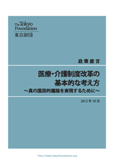Tokyo Foundation Policy Proposal on Healthcare Reform

Encouraging National Dialogue on Needed Reforms
Anxiety over Japan's medical and nursing care system has reached new heights in the light of the increasingly rapid aging of the population and the ballooning of the nation's public debt to unsustainable levels. As a result of the many minor revisions made over the years, the existing system has become extremely complex. Sweeping reforms are needed, and for this a bold new healthcare vision is required.
Over the past two years, the Tokyo Foundation's project on Crafting the Medical, Nursing-Care, and Social Security Systems of the Future explored the sustainability of the current system, built around industry-based health-insurance schemes and various other programs—including nursing care—broken down by age group. The project's policy recommendations are centered on areas requiring reform from the perspective of individual users.
Download the full policy proposal (Japanese only) ( PDF:1.1MB )
Summary of Recommendations
1. A Healthcare Vision: Achieve Closer Synergy between Medical and Nursing Care and Decentralize Policy Decisions
The existing healthcare system is premised on being "connected." Given the weakened sense of social unity, caused by the falling birthrate and aging of the population, along with the expansion of nonregular employment formats and the depersonalization of society, a new foundation for social connectivity is needed. In addition, the overreliance on a treatment-based system of medical reimbursement and an overly complex healthcare policy must be overhauled and replaced with a decentralized, community-based approach.
2. Medical Fee Reform: Shift Basis of Compensation from Treatment to Care
Overreliance on payment rules based on the medical treatments applied (measured as "insurance points") invites the temptation to accumulate points through an emphasis on quantity over quality. By introducing a system of "primary care" focused on providing integrated medical and nursing care for the community, new remuneration incentives can be introduced that encourage quality over quantity.
3. Establish Comprehensive Community Care Groups to Bolster Primary Care
Small hospitals, clinics, and other healthcare establishments within a community should be grouped together to enable the provision of comprehensive, continuous care. Contracts may be signed between patients (users) and medical facilities (care providers) to clarify overall responsibility for the health of individual residents and to establish a seamless healthcare system integrating medical and nursing care.

